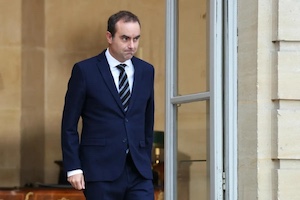French Political Crisis Unresolved: New Prime Minister Resigns After Just 27 Days in Office

France’s newly appointed Prime Minister Gabriel Le Cnuc, who had just formed his cabinet, was scheduled to hold his first cabinet meeting on the 6th. However, in a surprising turn of events, Le Cnuc held a press conference early that morning to announce his resignation.
Le Cnuc stated, “The positions of the various political parties remain unchanged. Apart from myself, who was willing to compromise, the other parties insist on having their proposals fully accepted by others.”
The French political scene has once again been thrown into turmoil. The resignation of the new prime minister after only 27 days in office has drawn significant domestic and international attention. This sudden political storm has once again highlighted the deadlock between the presidency and parliament, casting a shadow over France’s future policy-making.
According to a statement from the Élysée Palace, the Prime Minister officially submitted his resignation on the evening of the 7th, citing the lack of a stable majority in parliament and the difficulty in advancing policies. The President accepted the resignation after a brief consultation and emphasized that a new prime minister would be appointed as soon as possible to maintain normal government operations. However, many observers believe the sudden resignation is a result of long-standing internal divisions within the ruling party and strong resistance from the opposition.
Following the announcement, Paris’s financial markets experienced temporary turbulence, and the euro weakened in the short term, reflecting shaken investor confidence due to political instability. Several media outlets noted that the prime minister’s resignation after less than a month in office marks one of the shortest tenures in the history of France’s Fifth Republic. Opposition leaders seized the opportunity to criticize the President for a “lack of leadership” and called for the immediate dissolution of parliament and fresh elections.
Analysts pointed out that the crisis stems from a hung parliament following the recent elections. The ruling party failed to secure a majority and was forced to negotiate and compromise with various factions. Although the new prime minister had pledged “cross-party cooperation,” repeated rejections of tax reforms and social welfare bills stalled governance and paralyzed the administration. Facing continued setbacks in parliament, the prime minister felt powerless and ultimately chose to step down.
Public opinion in France has generally expressed dissatisfaction with the political deadlock. Interviewed citizens bluntly stated that whoever takes office should “focus on the economy and people’s livelihoods first,” rather than being trapped in partisan conflict. Recent polls show that up to 60% of French citizens believe the government has become inefficient and express widespread distrust toward politicians.
The European Union is also closely monitoring the situation. Officials in Brussels are concerned that prolonged instability in France—a core EU member—could affect regional economic cooperation and security policies. The German government has called on France to restore political stability as soon as possible, stressing that “Europe needs a strong Paris.”
Currently, attention is focused on who the President will nominate as the next prime minister. Rumored candidates include a former finance minister, a senior diplomat, and several regional leaders. The President is reportedly leaning toward choosing someone with cross-party appeal to help bridge the divide with parliament. However, most observers agree that regardless of who the new prime minister is, without changes to the current parliamentary structure, the political crisis will be difficult to truly resolve.
- 169 reads
Human Rights
Fostering a More Humane World: The 28th Eurasian Economic Summi

Conscience, Hope, and Action: Keys to Global Peace and Sustainability

Ringing FOWPAL’s Peace Bell for the World:Nobel Peace Prize Laureates’ Visions and Actions

Protecting the World’s Cultural Diversity for a Sustainable Future

Puppet Show I International Friendship Day 2020

